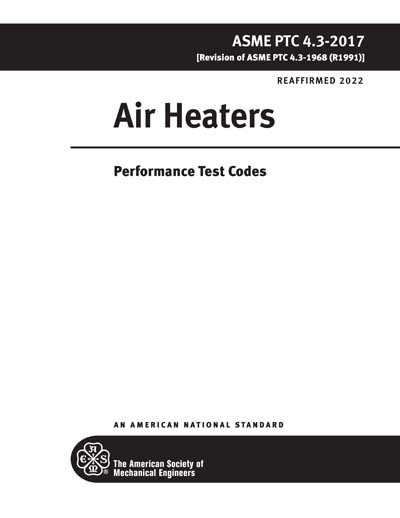Most recent
ASME PTC 4.3-2017 (R2022)
Air Heaters
This Code provides procedures for conducting performance tests of air heaters to determine: exit gas temperature; air to gas leakage; fluid pressure losses; and other fluid temperatures. It also provides procedures to determine the heat capacity ratio (X-ratio) and any or all of the performances results specified above that may be necessary for: checking actual performance against standard or design performance; comparing changes in performance over time with standard or design performance; comparing performance under various operating conditions; and determining the effect of changes in equipment. This Code applies to all air heaters used in industrial application, e.g., air heaters servicing steam generators and industrial furnaces. This specifically includes: combustion gas-to-air heat exchanger including air heaters with multi-section air streams; and air preheater coils utilizing noncondensing (single phase) steam, water or other hot fluids. This Code does not cover direct-fired air heaters or gas-to-gas heat exchangers. In the latter application, this Code may be used to determine both the thermal and pressure drop performance, while alternate methods of leakage measurement should be agreed upon between the parties. This Code also does not cover heat exchangers where the heating fluid is condensed while passing through the heater. Air heaters in parallel shall be tested individually (wherever possible) for purposes of checking actual performance. This Code requires pretest and post-test uncertainty analysis. The pretest uncertainty analysis is required in order to effectively plan the test. It allows corrective action to be taken prior to the test, either to decrease the uncertainty to a level consistent with the agreed-upon uncertainty, or to reduce the cost of the test while still attaining the objective. The post-test uncertainty analysis is used to determine the uncertainty intervals of the actual test. This analysis should confirm the pretest systematic and random uncertainty estimates. It serves to either validate the quality of the test results or to expose problems.
American Society of Mechanical Engineers [asme]

